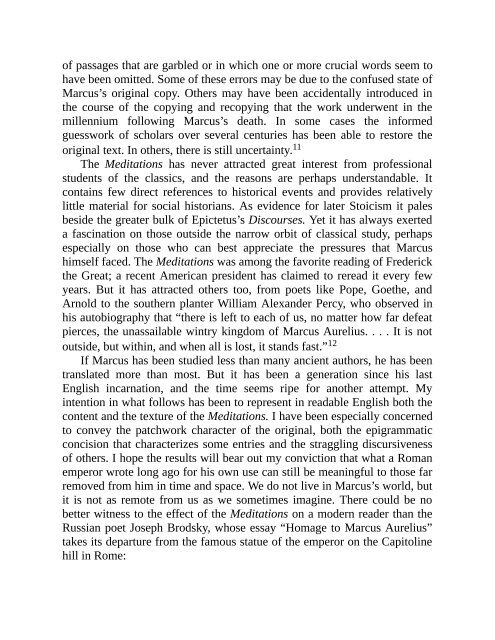9781945186240
You also want an ePaper? Increase the reach of your titles
YUMPU automatically turns print PDFs into web optimized ePapers that Google loves.
of passages that are garbled or in which one or more crucial words seem to<br />
have been omitted. Some of these errors may be due to the confused state of<br />
Marcus’s original copy. Others may have been accidentally introduced in<br />
the course of the copying and recopying that the work underwent in the<br />
millennium following Marcus’s death. In some cases the informed<br />
guesswork of scholars over several centuries has been able to restore the<br />
original text. In others, there is still uncertainty. 11<br />
The Meditations has never attracted great interest from professional<br />
students of the classics, and the reasons are perhaps understandable. It<br />
contains few direct references to historical events and provides relatively<br />
little material for social historians. As evidence for later Stoicism it pales<br />
beside the greater bulk of Epictetus’s Discourses. Yet it has always exerted<br />
a fascination on those outside the narrow orbit of classical study, perhaps<br />
especially on those who can best appreciate the pressures that Marcus<br />
himself faced. The Meditations was among the favorite reading of Frederick<br />
the Great; a recent American president has claimed to reread it every few<br />
years. But it has attracted others too, from poets like Pope, Goethe, and<br />
Arnold to the southern planter William Alexander Percy, who observed in<br />
his autobiography that “there is left to each of us, no matter how far defeat<br />
pierces, the unassailable wintry kingdom of Marcus Aurelius. . . . It is not<br />
outside, but within, and when all is lost, it stands fast.” 12<br />
If Marcus has been studied less than many ancient authors, he has been<br />
translated more than most. But it has been a generation since his last<br />
English incarnation, and the time seems ripe for another attempt. My<br />
intention in what follows has been to represent in readable English both the<br />
content and the texture of the Meditations. I have been especially concerned<br />
to convey the patchwork character of the original, both the epigrammatic<br />
concision that characterizes some entries and the straggling discursiveness<br />
of others. I hope the results will bear out my conviction that what a Roman<br />
emperor wrote long ago for his own use can still be meaningful to those far<br />
removed from him in time and space. We do not live in Marcus’s world, but<br />
it is not as remote from us as we sometimes imagine. There could be no<br />
better witness to the effect of the Meditations on a modern reader than the<br />
Russian poet Joseph Brodsky, whose essay “Homage to Marcus Aurelius”<br />
takes its departure from the famous statue of the emperor on the Capitoline<br />
hill in Rome:


